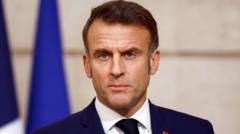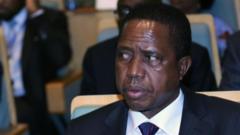In a critical political landscape shaped by recent upheaval, French President Emmanuel Macron has pledged to appoint a new prime minister within days, succeeding Michel Barnier, who resigned after a historic no-confidence vote in parliament. In a televised address, Macron emphasized his commitment to remain in office until the end of his term in 2027, rebuffing opposition calls for his resignation. Barnier lasted only three months in the role, marking a significant shift in the French political arena.
Macron's Promise: New Prime Minister to be Named Soon After Political Turmoil

Macron's Promise: New Prime Minister to be Named Soon After Political Turmoil
French President Emmanuel Macron announces the imminent appointment of a new Prime Minister following the abrupt resignation of Michel Barnier.
Macron held discussions with political leaders from various parties, including the Socialists, who indicated a willingness to negotiate a "fixed-term" government, but hesitated on endorsing a right-wing prime minister. The president expressed gratitude towards Barnier for his brief tenure but criticized opposition MPs for forming an "anti-republican front" that led to the government’s downfall—the first such occurrence in over six decades.
The political climate has become increasingly fragmented in the National Assembly, divided into major blocs of left, center, and far-right ideologies, complicating Macron's search for a suitable successor who can garner parliamentary support. The prospect of compromise remains uncertain, especially as the no-confidence motion was a collaborative effort by leftist groups and Le Pen's National Rally party.
Marine Le Pen defended the constitutional legitimacy of the vote against Barnier, highlighting the shifting dynamics of French politics. Although the budget was withdrawn with Barnier's resignation, he will serve on a caretaker basis until the new government is confirmed.
Macron acknowledged the backlash against his decision to call snap elections, which has contributed to the political deadlock, asserting it was his responsibility. Voters were reminded of the need for stability amidst rising chaos attributed to certain political factions focusing on future elections rather than resolving immediate concerns.
As speculation mounts regarding potential candidates for the prime ministership—including Defence Minister Sébastien Lecornu and centrist François Bayrou—the urgency for a new government grows. Time is of the essence, particularly with the solemn occasion of the Notre-Dame Cathedral’s reopening attended by world leaders on the horizon.
Macron has framed France’s ongoing projects, such as the cathedral’s reconstruction and the upcoming 2024 Olympics, as evidence of the nation's capability to achieve remarkable feats, despite the turmoil within its political framework.
The political climate has become increasingly fragmented in the National Assembly, divided into major blocs of left, center, and far-right ideologies, complicating Macron's search for a suitable successor who can garner parliamentary support. The prospect of compromise remains uncertain, especially as the no-confidence motion was a collaborative effort by leftist groups and Le Pen's National Rally party.
Marine Le Pen defended the constitutional legitimacy of the vote against Barnier, highlighting the shifting dynamics of French politics. Although the budget was withdrawn with Barnier's resignation, he will serve on a caretaker basis until the new government is confirmed.
Macron acknowledged the backlash against his decision to call snap elections, which has contributed to the political deadlock, asserting it was his responsibility. Voters were reminded of the need for stability amidst rising chaos attributed to certain political factions focusing on future elections rather than resolving immediate concerns.
As speculation mounts regarding potential candidates for the prime ministership—including Defence Minister Sébastien Lecornu and centrist François Bayrou—the urgency for a new government grows. Time is of the essence, particularly with the solemn occasion of the Notre-Dame Cathedral’s reopening attended by world leaders on the horizon.
Macron has framed France’s ongoing projects, such as the cathedral’s reconstruction and the upcoming 2024 Olympics, as evidence of the nation's capability to achieve remarkable feats, despite the turmoil within its political framework.





















